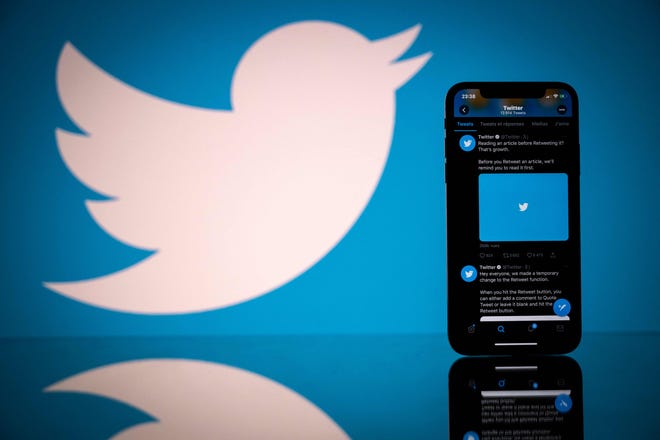Twitter ups efforts to stop misinformation, labeling falsehoods related to COVID-19 vaccine

Twitter is bolstering its efforts to point out misinformation on the platform, a long-standing problem across social media that has taken on new urgency amid last year’s election and through the pandemic.
“Starting today, we will begin applying labels to Tweets that may contain misleading information about COVID-19 vaccines, in addition to our continued efforts to remove the most harmful COVID-19 misleading information from the service,” Twitter said in a blog post Monday.
Since introducing COVID-19 guidance last spring and announcing it would remove harmful, misleading information about vaccines in December, Twitter has removed more than 8,400 tweets and “challenged” 11.5 million accounts across the globe.
At first, labels will be applied to Tweets by Twitter’s team when they determine that the content violates the company’s policy. After a while, those assessments will be used to inform Twitter’s automated tools to label similar content across the social media platform.
“Our goal is to eventually use both automated and human review to address content that violates our COVID-19 vaccine misinformation rules,” Twitter said. “Machine-learning and automated language processing takes time to be effective.”
Twitter will start by examining Tweets written in English, first and then expand to other languages and cultural contexts as time progresses. Labels on Tweets will appear in users’ set display language – the labels may also link to public health information, curated content or Twitter Rules.
“Our goal with these product interventions is to provide people with additional context and authoritative information about COVID-19,” Twitter said.
The company’s announcement Monday was two pronged. In addition to labels, they also introduced a “strike system,” which will help Twitter determine “when further enforcement action is necessary.”
“We believe the strike system will help to educate the public on our policies and further reduce the spread of potentially harmful and misleading information on Twitter, particularly for repeated moderate and high-severity violations of our rules,” Twitter said.
By using a “strike system,” Twitter is hopeful it can educate users on why their content is breaking the platform’s rules and allow them the chance to address and change their behavior.
The strike system has five levels:
- With one strike, no “account-level” action will be taken.
- With two strikes, the account will be locked for 12 hours.
- With three strikes, the account will be again locked for 12 hours.
- With four strikes, the account will be locked for seven days.
- With five or more strikes, the account will be permanently suspended.
An account suspension is eligible for appeal by user.
Misinformation plague goes beyond Twitter
Twitter isn’t the only social media platform to take action to stem the flow of false claims. Facebook and Google’s YouTube have also said they would remove falsehoods about the vaccines.
Emerson Brooking, resident fellow at the Atlantic Council’s Digital Forensic Research Lab and co-author of “LikeWar: The Weaponization of Social Media” told USA TODAY that the continued misinformation spread about COVID-19 is particularly concerning.
“I am deeply concerned because the same information campaign which initially downplayed the severity of COVID-19, downplayed the number of cases, then downplayed the number of deaths is now shifting to focus on the vaccine,” Brooking said.
According to a survey by Acxiom of 5,000 U.S. consumers from Nov. 25 to Dec. 4, conspiracy theories are shaping people’s perceptions of the vaccine. Some 44% of respondents said there’s some truth to the unfounded claim that the death rate from COVID-19 has been deliberately exaggerated and half of those, 22%, said it is “definitely true.” Even worse, 41% of respondents believe the coronavirus was either probably or definitely created and spread by powerful forces or people.
“Prior to this year, day to day, people generally didn’t think about vaccines. They were not reading content about vaccines. It wasn’t part of their daily intake,” said Kolina Koltai, a postdoctoral scholar at the University of Washington’s Center for an Informed Public, who studies the anti-vaccine movement. “Today, I feel like most people can’t go a whole day without hearing something COVID-related or vaccine-related.”
The volume of COVID-19 vaccine theories peddled by anti-vaccination groups large and small and hucksters looking to make a quick buck off people’s fears with bogus health remedies is increasing, researchers say. It’s already so vast they warn that social media platforms may be powerless to stanch it.
What’s more, this “infodemic” is only going to accelerate as more vaccines are approved, says Lisa Kaplan, founder of Alethea Group, which works on disinformation and misinformation threats.
If Americans are fooled by falsehoods masquerading as facts and don’t get the vaccine, they will be putting themselves and their communities at risk and delaying the nation’s return to normal, Kaplan said.
“That’s how we need to look at the severity of this,” she said. “We are talking about people’s lives, their jobs, their health and the health of their families. This is extremely high-stakes.”
Contributing: Jessica Guynn, USA TODAY
*** This article has been archived for your research. The original version from USA TODAY can be found here ***


